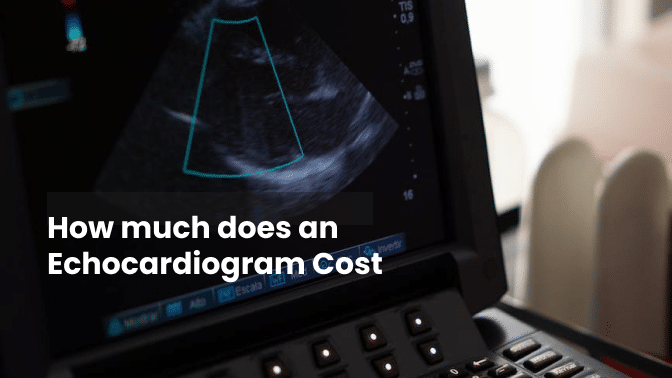This article will go over all you need to know about echocardiograms, including how much they cost in Nigeria and what they are used for.
An echocardiography is a non-invasive diagnostic procedure that produces fine-grained pictures of the heart using ultrasonic technology.
It is used to evaluate the composition and operation of the heart as well as to identify and keep track of diseases including heart failure and heart disease.
What is an Echocardiogram?
An echocardiogram, also known as an echo, is a diagnostic test that uses sound waves to create detailed images of the heart. It is a non-invasive procedure that can be performed in a hospital or outpatient clinic. During the test, a technician places a small device called a transducer on the chest, which sends sound waves through the chest wall and into the heart. These sound waves bounce back and are translated into images that can be viewed on a screen.
The images produced by an echocardiogram can help healthcare professionals evaluate the heart’s size, shape, and function, as well as detect any abnormalities or damage.
Echocardiogram Cost in Nigeria
The cost of an echocardiogram in Nigeria can vary depending on the facility where the test is performed, as well as the type of echocardiogram. Generally, the cost ranges between ₦20,000 to ₦50,000.
Private hospitals or clinics may charge higher fees compared to public hospitals or clinics, and the cost of a specialized echocardiogram such as a stress echocardiogram or a transesophageal echocardiogram may also be more expensive.
Function of an Echocardiogram
An echocardiogram is used to evaluate the structure and function of the heart. It can help detect a range of heart conditions, including:
- Heart disease: An echocardiogram can be used to diagnose and monitor heart disease, including coronary artery disease, valvular heart disease, and cardiomyopathy.
- Heart failure: An echocardiogram can help healthcare professionals assess the function of the heart and determine the severity of heart failure.
- Congenital heart defects: An echocardiogram can be used to diagnose and monitor congenital heart defects, which are heart abnormalities present at birth.
- Abnormal heart rhythms: An echocardiogram can help detect abnormal heart rhythms, such as atrial fibrillation, and assess their impact on the heart’s function.
- Blood clots: An echocardiogram can help detect blood clots in the heart, which can be a serious and potentially life-threatening condition.
Uses of Echocardiogram
It is a common diagnostic tool used to assess the structure and function of the heart. Here are some of the most common uses of echocardiograms:
- Diagnosing Heart Conditions: An echocardiogram is often used to diagnose heart conditions such as heart failure, heart valve disease, and congenital heart defects. The test provides detailed images of the heart, which can help doctors identify any abnormalities or damage.
- Assessing Heart Function: An echocardiogram can provide information about the function of the heart, including how well the heart is pumping blood and how efficiently the heart valves are functioning.
- Monitoring Heart Disease: An echocardiogram can be used to monitor the progression of heart disease over time. It can also be used to evaluate the effectiveness of treatments, such as medications or surgeries.
- Evaluating the Effect of Heart Damage: An echocardiogram can be used to evaluate the extent of heart damage caused by a heart attack or other cardiac event. It can also be used to assess the damage caused by conditions such as high blood pressure or diabetes.
- Assessing Cardiac Function During Pregnancy: An echocardiogram can be used to assess the cardiac function of a pregnant woman and her unborn child. It can also be used to detect any congenital heart defects in the fetus.
- Evaluating the Cause of Symptoms: An echocardiogram can be used to evaluate the cause of symptoms such as chest pain, shortness of breath, or fatigue. The test can help doctors determine if the symptoms are related to a heart condition or another underlying medical issue.
- Guiding Heart Procedures: An echocardiogram can be used to guide cardiac procedures such as heart valve repair or replacement. It can help doctors visualize the heart in real time, which can improve the accuracy of the procedure and reduce the risk of complications.
Overall, echocardiograms are a valuable tool in the diagnosis and treatment of heart conditions. They are non-invasive, safe, and relatively quick, making them an important tool for doctors to use in the care of their patients.
What You Need to Know About Echocardiograms
If you are scheduled for an echocardiogram, there are a few things you can do to prepare. You will typically be asked to avoid eating or drinking for a few hours before the test, as well as to wear loose, comfortable clothing. You may also be asked to avoid caffeine and certain medications before the test, as they can affect the results.
During the test, you will be asked to lie on your back while the technician places the transducer on your chest. You may be asked to change positions or take deep breaths to help the technician obtain the best images.
After the test, you can resume normal activities immediately. Your healthcare provider will review the results with you and determine any necessary next steps.
Conclusion,
An echocardiogram is a non-invasive diagnostic test that can provide valuable information about the heart’s structure and function. While the cost of an echocardiogram in Nigeria may vary depending on the facility and type of echocardiogram, it is an important test that can help diagnose and monitor a range of heart conditions
